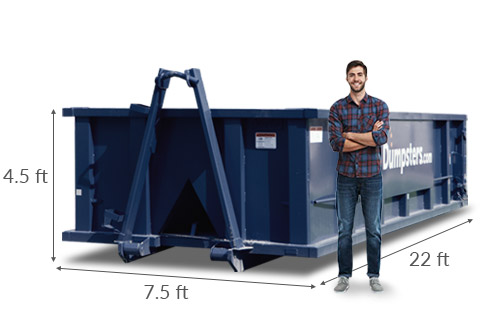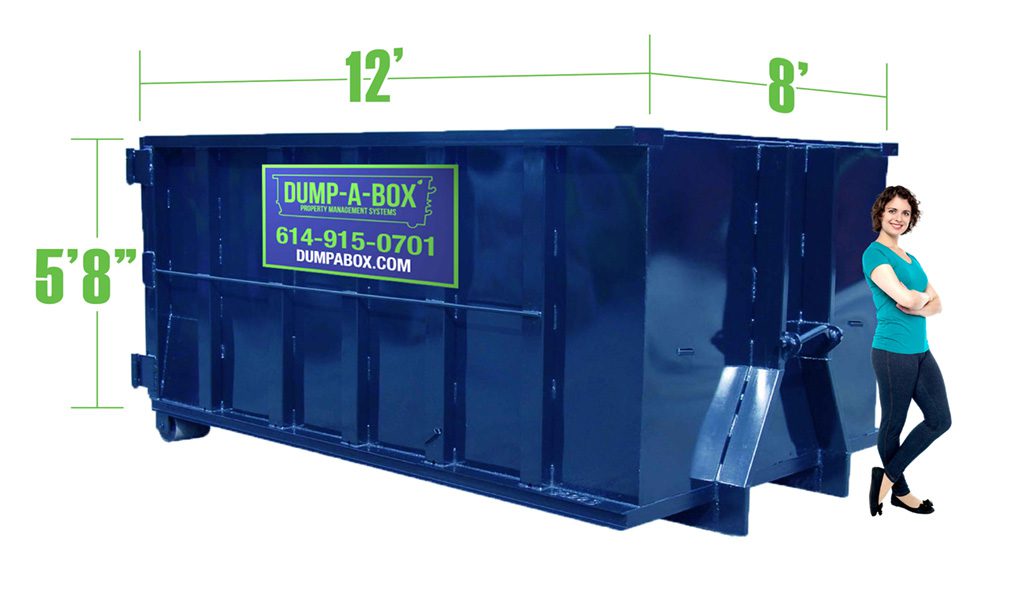A successful dumpster rental experience is built on several vital pillars, consisting of selecting the right dumpster size and type for the task, understanding and complying with local regulations, and planning for sufficient space to accommodate the dumpster. Efficient waste administration also requires handling disposal expenses, reducing ecological impact with segregation and recycling, and guaranteeing reliable service from the rental supplier. By taking into consideration these variables, people can assure a hassle-free and efficient waste removal procedure. As you discover the globe of dumpster services, you'll uncover the value of these elements in accomplishing a smooth and effective experience.
Choosing the Right Dumpster Size
When tackling a massive clean-up or building project, an important facet to think about is the waste monitoring strategy, specifically the dumpster size
A dumpster that is also tiny can bring about constant emptying, resulting in increased prices and project delays On the various other hand, a dumpster that is also large can be a waste of sources and occupy valuable space on duty site.

To establish the best dumpster size, take into consideration the range of the task, the sort of materials being taken care of, and the available area at work site.
A basic general rule is to estimate 1-2 cubic backyards of dumpster room per 1,000 square feet of job area. In addition, think about the weight and volume of the materials being disposed of, as well as any type of local regulations or constraints on dumpster size.
Selecting the Correct Dumpster Type
Selecting the appropriate dumpster type is an essential factor to consider along with determining the appropriate dumpster size Various jobs need distinct piedmonttriaddumpsters.com dumpster types to ensure efficient waste management.
For instance, construction projects commonly require heavy-duty dumpsters with high weight abilities to take care of bulky products like concrete and asphalt. On the other hand, residential cleanouts or little restoration jobs may need lighter-duty dumpsters with reduced weight capacities.
Roll-off dumpsters are suitable for massive projects, offering adequate room for bulk waste disposal. They are generally readily available in numerous sizes, varying from 10 to 40 lawns, and can be quickly delivered to and from the job site.
Meanwhile, compactors and recycling dumpsters satisfy certain waste monitoring needs, such as compressing waste or setting apart recyclable materials.
When selecting a dumpster kind, take into consideration the job's range, waste quantity, and product types to guarantee you're obtaining the ideal fit. This will certainly assist optimize waste disposal, lower prices, and enhance total project efficiency
Understanding Regional Regulations
Most construction projects involve a substantial quantity of waste, and dealing with it effectively is essential to preserving a clean and risk-free worksite.
Understanding local regulations is critical to guaranteeing that waste disposal is done appropriately. Failure to adhere to policies can result in fines, penalties, and also task delays.
It is essential to study and comprehend the particular laws in your location, including what types of materials can be disposed of in a dumpster, just how they should be arranged, and just how typically they ought to be emptied.
Additionally, some areas might have particular rules about where dumpsters can be put, how they ought to be protected, and who is in charge of their maintenance.
By putting in the time to recognize local regulations, you can prevent costly errors and warranty that your construction job runs smoothly.
This understanding will likewise assist you select the best dumpster rental company, as they must be familiar with regional laws and can supply assistance on compliance
Obtaining Necessary Permits
Before commencing with dumpster rental, it is essential to secure the necessary permits to assure an easy construction project.
Failure to obtain the called for authorizations can cause costly fines, job hold-ups, and even legal action. To avoid these problems, it's crucial to research study and acquire the necessary permits from local authorities prior to positioning the dumpster on your property.
Typically, licenses are needed for dumpsters put on public property, such as sidewalks or streets.
However, some municipalities might additionally require permits for dumpsters on personal property. The sort of authorization needed will certainly depend upon the area, size, and period of the dumpster rental.
Be certain to contact your city government to figure out the certain permits needed for your project.

Planning for Enough Space
Having a clear understanding of the available space is vital when planning for dumpster leasing, as it directly influences the performance of the waste administration process An adequate amount of space is needed to suit the dumpster, ensuring easy accessibility and reducing interruptions to daily operations.
Failure to prepare for sufficient area can lead to logistical nightmares, causing expensive hold-ups and inconvenience.
When figuring out the required area, take into consideration the size of the dumpster, the location where it will certainly be put, and the traffic flow in the surrounding location. Establish the room is clear of obstacles, such as overhanging cords, trees, or other frameworks that may hinder the dumpster's placement or accessibility.
Additionally, take into consideration the type of waste being gotten rid of and the regularity of pick-ups to ascertain the space can suit the quantity of waste created. By planning for adequate room, you can ensure a smooth and stress-free dumpster rental experience that meets your waste monitoring needs.
Coordinating Distribution and Pickup
- Confirm the delivery day and time with your company to assure you're on website to get the dumpster. Designate a clear and available area for the dumpster to be put, avoiding any type of challenges or hazards. Schedule the pickup day in advance to avoid extra rental charges or penalties. Be prepared to have the dumpster packed and all set for pick-up at the scheduled time to avoid delays or added charges.
Managing Garbage disposal Costs
Effective waste management is necessary to reducing disposal costs, and recognizing the variables that affect these expenses is essential to remaining within budget.
One considerable aspect to think about is the dumpster rental period, as longer service durations can bring about greater prices. In addition, the type and size of the dumpster likewise impact disposal costs, with larger dumpsters and specialty dumpsters for harmful materials typically being more expensive.
Moreover, the weight and sort of waste being dealt with can additionally impact expenses, as some materials might call for special handling or processing It is necessary to properly estimate waste volumes and kinds to assure the correct dumpster size and rental duration are chosen.
Clear interaction with the dumpster rental supplier is vital to staying clear of shock expenses and assuring a successful dumpster rental experience.
Minimizing Environmental Impact
Beyond the monetary advantages of effective waste administration, lessening environmental effect is an important factor to consider for people and businesses alike. The way we manage waste can have a significant impact on the setting, and it's vital to take steps to minimize our ecological footprint.
To decrease ecological impact, think about the following:
- Proper waste segregation: Separating recyclable products from non-recyclable waste warranties that recyclables are refined properly, decreasing the amount of waste sent out to landfills. Choosing the best dumpster size: Selecting a dumpster that's the best dimension for your task protects against overfilling and decreases the variety of trips required to transport waste, resulting in lower emissions. Partnering with green dumpster rental companies: Working with firms that prioritize sustainability and environmentally accountable techniques can help reduce the environmental influence of waste management. Implementing sustainable waste reduction strategies: Urging recycling, minimizing waste generation, and executing waste-to-energy options can considerably lessen ecological impact.
Ensuring Reputable Dumpster Service
One crucial aspect of an effective dumpster rental experience is ensuring reliable dumpster service This involves greater than just renting out a dumpster; it needs a hassle-free experience from start to finish.
A trustworthy dumpster service provider will certainly deliver the dumpster on time, location it in the proper place, and select it up when arranged. They will certainly additionally offer clear instructions on just how to use the dumpster safely and efficiently.

Additionally, a trusted company will certainly have a group of specialists that are well-informed, well-mannered, and responsive to any type of issues or issues that might occur during the rental period. This consists of having a dedicated customer support team available to respond to questions and resolve any kind of troubles promptly.
Effective Waste Partition Strategies
As waste management plays an important duty in keeping a clean and healthy setting, carrying out effective waste segregation strategies is necessary to validate that waste is dealt with in an environmentally accountable manner This entails separating waste into various categories, such as recyclables, organics, and non-recyclable products, to make sure that each kind of waste is taken care of and disposed of accordingly.
- Identify and separate hazardous waste, such as batteries, electronics, and chemicals, which need special handling and disposal. Designate areas for recyclable products, like paper, plastic, and glass, to promote their collection and processing. Implement a composting program for organic waste, like food scraps and lawn trimmings, to reduce waste sent out to landfills and create nutrient-rich soil. Establish clear standards and signage to educate and encourage people to participate in waste segregation efforts.